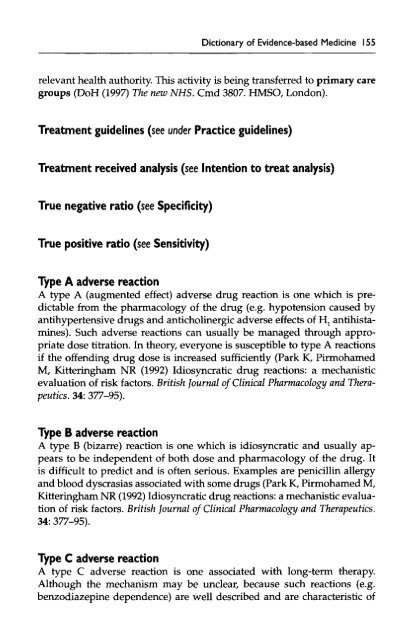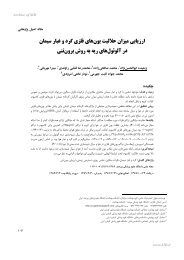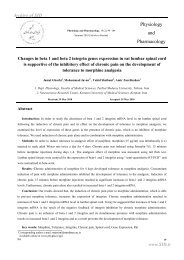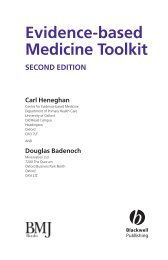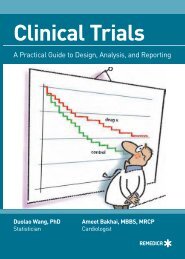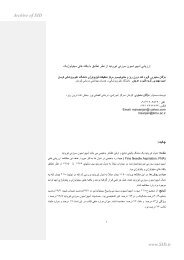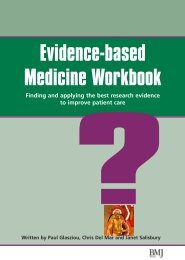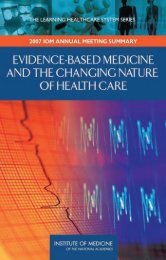Dictionary of Evidence-based Medicine.pdf
Dictionary of Evidence-based Medicine.pdf
Dictionary of Evidence-based Medicine.pdf
You also want an ePaper? Increase the reach of your titles
YUMPU automatically turns print PDFs into web optimized ePapers that Google loves.
<strong>Dictionary</strong> <strong>of</strong> <strong>Evidence</strong>-<strong>based</strong> <strong>Medicine</strong> 155<br />
relevant health authority. This activity is being transferred to primary care<br />
groups (DoH (1997) The new NHS. Cmd 3807. HMSO, London).<br />
Treatment guidelines (see under Practice guidelines)<br />
Treatment received analysis (see Intention to treat analysis)<br />
True negative ratio (see Specificity)<br />
True positive ratio (see Sensitivity)<br />
Type A adverse reaction<br />
A type A (augmented effect) adverse drug reaction is one which is predictable<br />
from the pharmacology <strong>of</strong> the drug (e.g. hypotension caused by<br />
antihypertensive drugs and anticholinergic adverse effects <strong>of</strong> Hj antihistamines).<br />
Such adverse reactions can usually be managed through appropriate<br />
dose titration. In theory, everyone is susceptible to type A reactions<br />
if the <strong>of</strong>fending drug dose is increased sufficiently (Park K, Pirmohamed<br />
M, Kitteringham NR (1992) Idiosyncratic drug reactions: a mechanistic<br />
evaluation <strong>of</strong> risk factors. British Journal <strong>of</strong> Clinical Pharmacology and Therapeutics.<br />
34: 377-95).<br />
Type B adverse reaction<br />
A type B (bizarre) reaction is one which is idiosyncratic and usually appears<br />
to be independent <strong>of</strong> both dose and pharmacology <strong>of</strong> the drug. It<br />
is difficult to predict and is <strong>of</strong>ten serious. Examples are penicillin allergy<br />
and blood dyscrasias associated with some drugs (Park K, Pirmohamed M,<br />
Kitteringham NR (1992) Idiosyncratic drug reactions: a mechanistic evaluation<br />
<strong>of</strong> risk factors. British Journal <strong>of</strong> Clinical Pharmacology and Therapeutics.<br />
34: 377-95).<br />
Type C adverse reaction<br />
A type C adverse reaction is one associated with long-term therapy.<br />
Although the mechanism may be unclear, because such reactions (e.g.<br />
benzodiazepine dependence) are well described and are characteristic <strong>of</strong>


